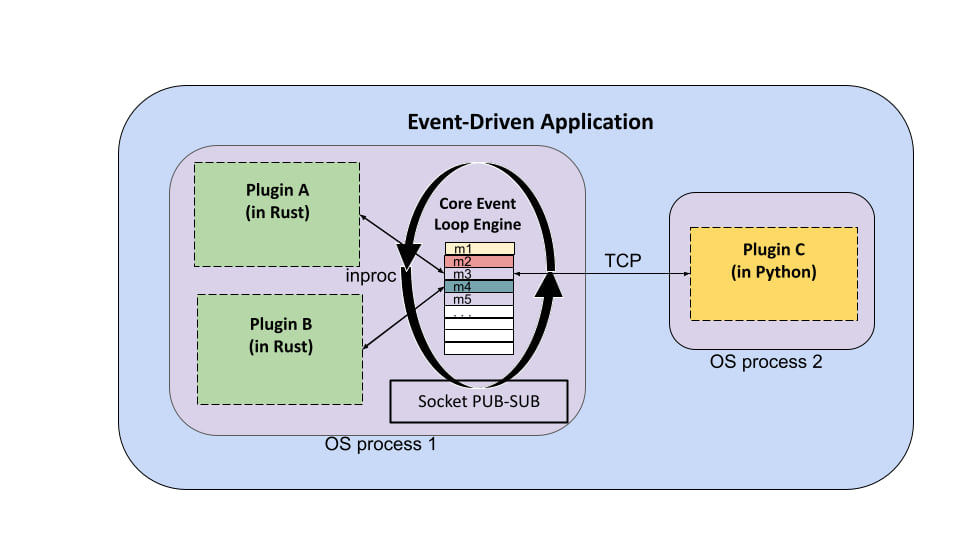5 releases
| 0.2.0 | Sep 29, 2022 |
|---|---|
| 0.1.3 | Sep 28, 2022 |
| 0.1.2 | Sep 28, 2022 |
| 0.1.1 | Aug 26, 2022 |
| 0.1.0 | Aug 20, 2022 |
#34 in #plugins
47KB
731 lines
Event Engine
The event-engine project provides a framework for writing event-based applications that utilize a plugin architecture. Applications built with event-engine are written in Rust but can include plugins written in multiple languages.
Events correspond to statically typed messages that can be transmitted over a socket and are the basic mechanism of communication between plugins of the application. Each application defines its own event types, including the mechanisms for serializing and deserializing an event's message to/from bytes. No assumption is made about the serialization format used for events, and different event types can utilize different formats.
Plugins are independent components of an application that create and consume events. Each plugin defines
the event types it is interested in, and the core event-engine proxies event messages to the application's
plugins using a publish-subscribe pattern.
Plugins can be "internal" or "external". Internal plugins run as child threads within the main (Rust) application process and are necessarily written in Rust. External plugins run as separate OS processes and can be written in any language.
All event message communication happens via zmq sockets which event-engine manages. Internal plugins
send and receive event messages using inproc sockets while external plugins use TCP sockets.

Usage
The main steps to building an application using event-engine are as follows:
- Define the
EventTypes andEvents for the application. Theevents.rsmodule includes two traits,EventTypeandEvent, to be implemented. - Define the plugins for the application. These are the independent components that will create and consume
events. The
plugins.rsmodule includes thePluginandExternalPlugintraits to be implemented. - Create an
event_engine::Appobject and configure it with the plugins for the application. For example,
use event_engine::App;
// define events and plugins
// create the App object, register the plugins and run
fn main() {
// two Rust plugins
let msg_producer = MsgProducerPlugin::new();
let counter = CounterPlugin::new();
// an external plugin written in python
let pyplugin = PyPlugin::new();
// main application object
let app: App = App::new(5559, 5560);
app.register_plugin(Arc::new(Box::new(msg_producer)))
.register_plugin(Arc::new(Box::new(counter)))
.register_external_plugin(Arc::new(Box::new(pyplugin)))
.run()
.unwrap();
()
}
In the case of external plugins, a small Python module, events.py, included within the pyevents
directory of this repository, has been written to simplify the process of writing Python plugins.
There is also a Docker image, tapis/pyevents, which can be used to build a standalone container
with a Python plugin.
Example
This repository includes a complete example application consisting of two (internal) Rust plugins and
one external Python plugin. The application is packaged as two Docker containers -- the main Rust
application, with the two Rust plugins, runs in the first container and the Python plugin runs in the second
container. See the example directory for more details.
Design and Architecture
As mentioned in the introduction, the even-engine framework is designed around two primary notions:
- events of interest in the application will be described as typed messages that can be transmitted over a socket; and
- independent application components, referred to as plugins, will register events they are interested in receiving.
The subsequent sections discuss the design and architecture of event-engine in more detail.
ZMQ Sockets and Publish-Subscribe
ZMQ sockets provide a foundational building block for event-engine. The ZMQ socket exposes a single API supporting
multiple transports, including in-process, inter-process and TCP. It also enables a number of advanced messaging
patterns, such as request-reply and pub-sub, while simultaneously handling issues such as auto-reconnect.
In ZMQ, all sockets have a type, and socket types tend to work together in pairs. event-engine uses two socket
type pairs to enable its functionality: PUB-SUB sockets are used to allow plugins to publish events and receive
events generated by other plugins, and REP-REQ sockets are used to sync all plugins at the start of an application,
to ensure that no plugin misses initial messages that are sent.
The engine creates socket objects for itself and for each of the plugins. The socket types mirror each other:
-
The engine creates an "outgoing" socket bound to an
inprocURL and TCP port of typePUBfor itself, and it creates a correspondingSUBsocket bound to the same endpoints for each plugin. This is the socket on which plugins receive new event messages. -
Similarly, the engine creates an "incoming" socket bound to an
inprocURL and TCP port of typeSUBfor itself, and it creates a correspondingPUBsocket bound to the same endpoints for each plugin. This is the socket on which plugins publish new event messages. -
It creates a "sync" socket of type
REPthat the engine uses and of typeREQthat each plugin uses for synchronization.
Synchronization works in two steps: first, each plugin is started with a REQ socket, and it sends a "ready" message on
this socket once it is started. The plugin then blocks, waiting for a reply from the engine. The engine collects a
"ready" message from each registered plugin before sending an "ok" reply (on its corresponding REP sockets) to each
plugin. Once a plugin thread has received an "ok" reply, its start function is executed.
Interfaces
Concurrency
Developing event-engine
Working
Dependencies
~1.5–2.2MB
~44K SLoC